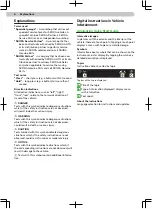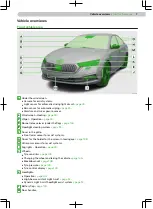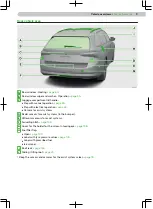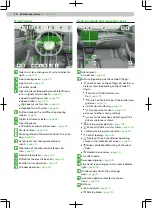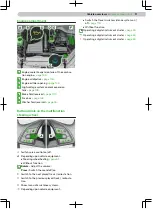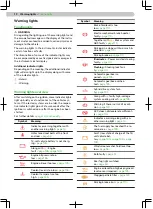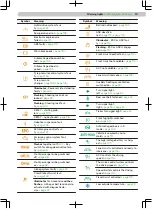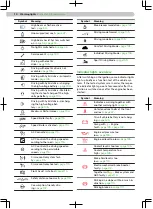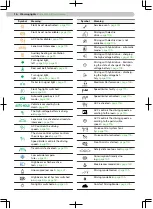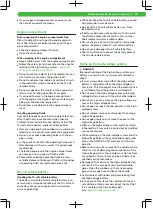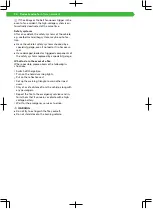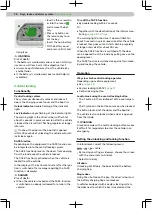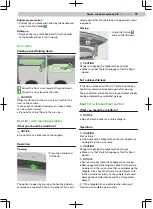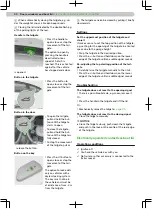
▶
If you suspect damaged sensors or cameras, use
the help of a specialist company.
Engine compartment
Before opening the engine compartment flap
Risk of scalding! Do not open the engine compart-
ment flap if steam or coolant comes out of the en-
gine compartment.
▶
Stop the engine and allow it to cool.
▶
Open the driver door.
When working in the engine compartment
▶
Keep children away from the engine compartment.
▶
Follow the safety instructions listed in the chapter
relating to the high-voltage system
.
▶
Do not touch the radiator fan. The radiator fan can
turn itself on, even when the ignition is off.
▶
Do not touch electrical cables. Avoid short circuits
in the electrical system, especially on the 12 volt
vehicle battery.
▶
Do not smoke near the vicinity of the engine and
refrain from handling open flames or sparks.
▶
If you need to work in the engine compartment
with the engine running, be mindful of rotating en-
gine parts and electrical equipment.
▶
Do not leave any objects in the engine compart-
ment.
Handling operating fluids
Your vehicle needs various fuels to operate that can
affect health or the environment when they are
emitted. These include fuel, oils, battery acid of the
12-volt vehicle battery, coolant and brake fluid.
▶
Only use operating fluids outdoors or in well-venti-
lated areas. If required, wear protective equipment.
▶
Do not use or check operating fluids with the en-
gine running.
▶
In the event of contact with operating fluids, wash
affected areas with warm water. If required, seek
medical help.
▶
The leaked engine oil in the engine compartment
can cause a fire, so wipe it off with a cloth.
▶
Store cloths soiled by operating fluids in a well-
ventilated place until disposal. Cloths with residues
of operating fluids can ignite and cause a fire.
12-volt vehicle battery
Handling the 12-volt vehicle battery
The battery acid of the 12-volt vehicle battery is se-
verely caustic. Improper handling of the 12-volt vehi-
cle battery can cause an explosion, fire, chemical
burns or poisoning!
▶
When handling the 12-volt vehicle battery, eye and
skin protection must be worn.
▶
Do not tilt the 12-volt vehicle battery, as it may
leak battery acid.
▶
If battery acid comes into contact with skin, wash
the affected areas with water for a few minutes.
Seek medical assistance without delay.
▶
Do not charge a frozen or thawed 12-volt vehicle
battery. Replace a frozen 12-volt vehicle battery.
▶
Do not use a damaged 12-volt vehicle battery.
▶
Short circuit! Do not connect the battery poles of
the 12-volt vehicle battery.
Notes on the high-voltage system
DANGER
Improper handling of the high-voltage system and
battery can result in burns, injuries or fatal electric
shock.
▶
It must always be assumed that the high-voltage
battery is charged and that the high-voltage sys-
tem is live. This also applies when the electric drive
is switched off and the ignition is switched off.
▶
Do not touch the high-voltage cables or the high-
voltage battery, even with the aid of other objects.
▶
Do not carry out any work on the high-voltage sys-
tem or the high-voltage battery.
▶
Do not open or repair the components of the high-
voltage system.
▶
Do not replace, remove or disconnect the orange
high-voltage cables.
▶
Do not open, replace, or remove the cover of the
high-voltage battery.
▶
Work on the high-voltage system and the systems
influenced by it may only be carried out by qualified
service technicians.
▶
When working on the high-voltage system and the
high-voltage battery, the specifications and guide-
lines of the ŠKODA AUTO company must be ad-
hered to.
▶
Before carrying out any work on the vehicle, where
there is a risk of damaging the components of the
high-voltage system, the vehicle must be free from
any voltage. This work may only be carried out by
qualified service technicians.
▶
Damage to the vehicle or the high-voltage battery
can result in the escape of toxic and flammable
gases. Open the windows so that any escaping
gases can escape from and leave the vehicle.
▶
Avoid contact with liquids and gases leaking from
the high-voltage battery.
▶
In the event of fire, leave the vehicle and stay at a
safe distance. Inform rescuers about the fact that
it is a vehicle with a high-voltage bat-
19
Correct and safe › Engine compartment


